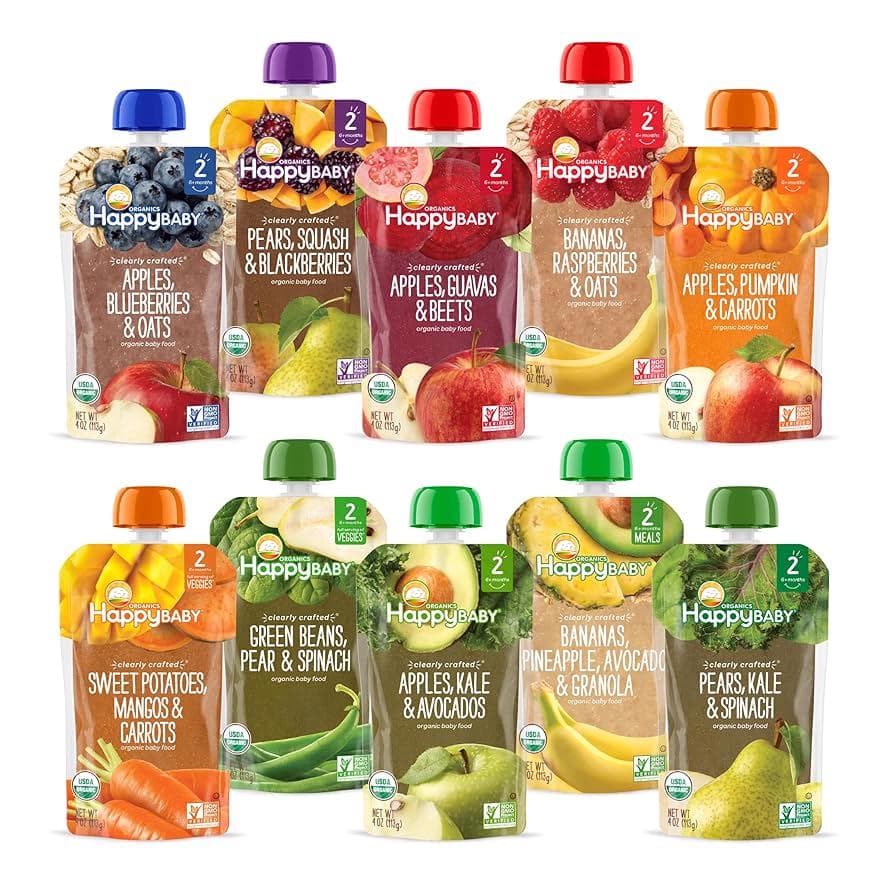



At Olive, we believe every parent deserves clear, unbiased information about what’s really in their child’s food.
That’s why we commission independent lab testing through ISO-accredited partners—so you can make informed choices with confidence. This month, we tested 365 Whole Foods Market Organic Baby Apple Spinach Kale, a popular fruit and vegetable puree found on many grocery shelves.
Our goal: to provide transparent, trustworthy data about heavy metals in this product, and what that means for your family.
365 Whole Foods Market Organic Baby Apple Spinach Kale is a fruit and vegetable puree designed for infants and young children. Whole Foods baby food products are often chosen by parents seeking organic, minimally processed options. But as awareness grows about heavy metals in baby food, it’s important to look beyond the label and understand what’s actually inside.
Olive commissioned Light Labs, an ISO-accredited laboratory, to test this product for four key heavy metals: lead, cadmium, arsenic, and mercury. These tests were performed using validated methods and compared against the most protective safety standards available, including EU Regulation 2023/915, FDA “Closer to Zero” action levels, Clean Label Project guidelines, and California Proposition 65 for lead exposure.
| Contaminant | Level | Limit |
|---|---|---|
| Lead | 6.04 ppb | ❌ Exceeds Limit |
| Cadmium | 2.45 ppb | ✅ Pass |
| Arsenic | 2.7 ppb | ✅ Pass |
| Mercury | < 0.12 ppb | ✅ Pass |
For complete transparency, you can view the full Certificate of Analysis (COA) from our ISO-accredited laboratory partner:
A single serving of this product exceeds California's Prop 65 lead limit, accounting for 136.50% of the daily threshold. This means that even one pouch per day is above the state’s recommended daily lead exposure for children and people who are pregnant or may become pregnant.
This product contains more than the daily recommended lead exposure limit per serving according to California Proposition 65. Consuming a single serving exposes your child to more lead than the state’s most protective daily guideline.
The safety limits for heavy metals in baby food are designed to protect infants and young children, who are especially vulnerable to toxic exposures. For this category, the strictest limits are:
While cadmium, arsenic, and mercury levels in 365 Whole Foods Market Organic Baby Apple Spinach Kale were well below these limits, the lead content measured at 6.04 ppb. This is under the 10 ppb maximum, but when calculated per serving, it exceeds the daily exposure limit set by California Prop 65—one of the strictest standards in the world.
Lead is a heavy metal with no safe level of exposure, especially for infants and young children. Even low levels can affect brain development, behavior, and learning. California’s Prop 65 law sets a very conservative daily exposure limit to help protect those most at risk. Exceeding this limit—even by a single serving—means there is a higher potential for cumulative exposure over time, which is why it’s so important for parents to be aware.
The presence of lead in this 365 Whole Foods Market baby food is not unique—many fruit and vegetable purees can contain trace amounts due to environmental factors. However, this product’s lead content per serving is high enough to exceed California’s daily recommended limit. While occasional consumption is unlikely to cause immediate harm, repeated exposure over time is a concern, especially for children under two.
Is 365 Whole Foods Market baby food safe?
While this product meets federal and EU limits for heavy metals, it exceeds California’s Prop 65 daily lead exposure limit per serving. Parents should consider limiting how often their child consumes this specific puree.
Does 365 Whole Foods Market baby food have heavy metals?
Yes, our independent lab testing found measurable levels of lead (6.04 ppb), as well as low levels of cadmium and arsenic. Mercury was not detected.
What do the lab results mean for my child’s health?
The lead level per serving is above California’s strictest guideline for daily exposure. While occasional servings are unlikely to cause immediate harm, regular consumption could increase long-term risk, especially for infants and toddlers.
Want to know what's really in your family's food? All of this detailed lab testing data—and comprehensive information on thousands of other products—is available instantly on the Olive app. Simply scan any barcode and get complete food safety results in seconds.
Download Olive today and take the guesswork out of grocery shopping. Your family's health is worth those extra few seconds of scanning.
Instant Barcode Scane
Allergen Detection
Clear Ingredient Insights
Get Personalized Suggestions

Discover everything you need to know about Happy Baby Pouches: A Parent's Guide to ensuring safe and nutritious choices amidst heavy metals concerns.
Sep 25, 2025
Is sesame oil a seed oil? Yes — but not all seed oils are harmful. Learn why sesame oil is different from the “Hateful Eight” and discover the best sesame oil substitutes like oliv...
Sep 25, 2025Always.
We never monetize through brand deals, affiliate links, or ads — so you can trust our recommendations are always aligned with our users.
Effortless food scanning
Peace of mind for parents
Healthy product recommendations